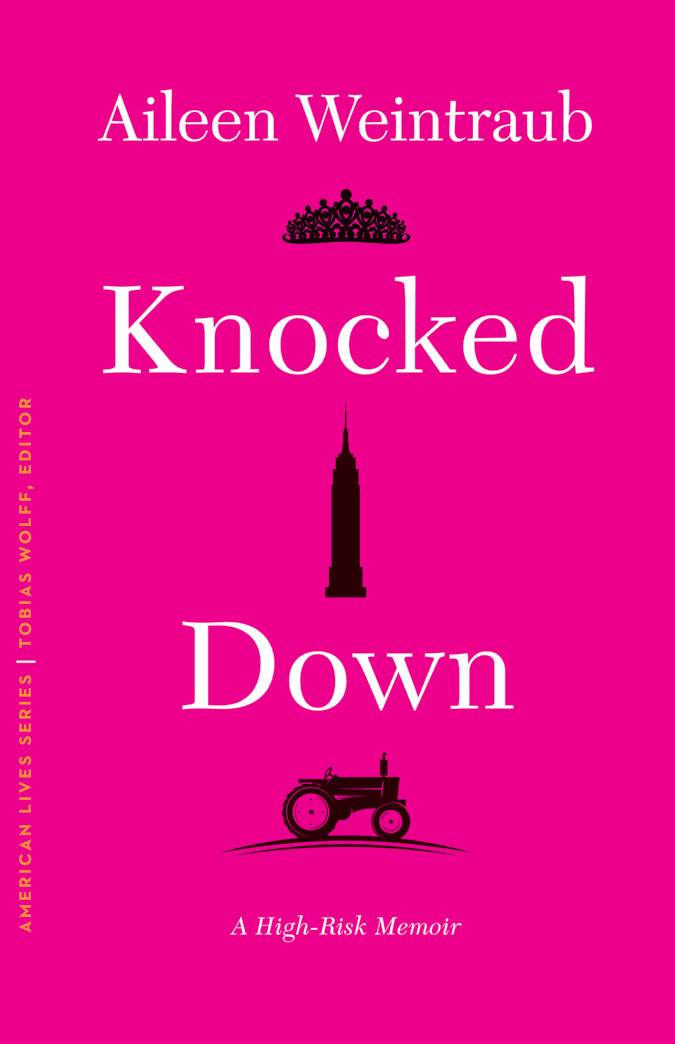Mother’s Day Magazine talks with author Aileen Weintraub about Knocked Down: A High-Risk Memoir, a story about interfaith marriage, motherhood, and the risks we take. Her book comes out in March and is available for pre-order from Rough Draft Bar and Books, University of Nebraska Press, Amazon, and wherever books are sold. You can find Aileen on Twitter @aileenweintraub or visit her website at www.aileenweintraub.com.
What motivated you to write Knocked Down?
Knocked Down: A High-Risk Memoir came about in an extraordinary way. Before becoming pregnant and landing on bed rest for five months, I was a successful freelance writer and editor. Bed rest turned everything upside down, and five years later I was still struggling to get back to my career, raise a family, and do all the things society expects women to do. Like so many mothers, I had lost an important part of who I was. As a first step to taking back my autonomy, I gathered a group of amazing women together for a book club. We chose a book called The Happiness Project by Gretchen Rubin about leaning into happiness. Writing Knocked Down became my happiness project.
I knew I had an important story to tell, and I was motivated to make sure that other women going through what I went through didn’t feel alone. Bed rest is an isolating experience, and it can leave a woman feeling very vulnerable. I wanted to share my story in a way that not only empowered women but made them feel like they were hanging out with a friend and laughing. Though my book deals with serious topics such as the possibility of losing a child, a troubled marriage, and the grief that comes from mourning the loss of my father, I wanted to show readers that even in tough moments, there is humor and pockets of joy to be found.
What do you wish someone had told you about going on bed rest before you did it?
There is simply not enough attention paid to the difficulties women on bed rest face. I lost my career, my finances suffered, and my relationship began to collapse right along with our old farmhouse. It was overwhelming. Most people don’t realize that bed rest isn’t just about getting into bed for a few weeks, it’s about giving up your entire life to nurture the life growing inside you. And that is incredibly important work. I would tell a woman on bed rest: You are doing hard things. It will be one of the most difficult times of your life, but you will get through this.
i DON’T THINK WE TALK ENOUGH ABOUT HOW DIFFICULT IT IS TO BE PREGNANT AND HOW ISOLATING RAISING CHILDREN CAN BE.
Practically, there is so much to tell a woman on bed rest. First, rally your support system. Let people help you and be specific about how they can help. Ask your friends to bring you lunch and maybe even wipe down your countertops or pick up groceries. People want to help, they just don’t always know how. Women are often afraid to ask for help. Don’t be afraid to ask. Finally, advocate for yourself. Make sure your doctor listens to your concerns and addresses them. You deserve to be heard.
What advice would you give to the mama-to-be’s loved ones on how best to support her while she’s on bed rest?
I’m so glad you asked this question because as I mentioned above, it is so difficult for women to ask for help. No one wants to feel like a burden, so it’s a big relief when others reach out. I would say, instead of just asking, “How can I help?” offer specific services. Running errands, coming over to straighten the house, cooking meals, driving the person to and from doctor’s appointments are all great. But honestly, one of the best things someone could do is bring lunch, sit with the person, watch a movie, paint their toes, do their makeup for them, be silly, and have fun. I had one friend who would order take-out and eat a meal with me, and that made me feel like so much more than a patient who needed care. I’ll never forget that kindness because it wasn’t about getting something done that had to be done, like laundry, though that is important too, it was about spending time with me and making me forget for a brief moment that I was stuck in bed.
At times, you talked about feeling shame—for example, at not being able to carry a baby naturally or having “The Monsters” (fibroids). Many moms can probably relate to that feeling if they struggled to breastfeed, delivered prematurely, etc. What would you say to them?
I felt so much shame, and I think many other mothers do too. In Knocked Down, there is a scene where I howl so loud in frustration that the house shakes because I feel like I’ve failed as a mother. Why are we so full of shame? We are all doing the best we can, and we have to stop being so hard on ourselves. I don’t think we talk enough about how difficult it is to be pregnant, and how isolating raising children can be.
So many of us are walking around with hidden shame and fear, and we need to understand that many of us experience these feelings and then find a way to support and uplift one another. That’s why I wrote Knocked Down. I want others to know that they are not on this journey alone, whether it is a high-risk pregnancy, prenatal depression, PPD, PPA, or anything else. We need to normalize talking about these issues.
In the book, you talk about feeling invisible in your marriage during your pregnancy and trying a variety of things to reconnect with your husband. What do you wish you could say to your pregnant self, looking back at that time?
When tragedy strikes, it’s easy to lose sight of your relationship and stop connecting in a meaningful way. My husband and I were both trying to keep our heads above water. We were struggling financially, and our house was in desperate need of repairs. There’s a scene in the book where we literally have no front door and the contractor just up and leaves it like that. Of course, it immediately starts raining. In retrospect it’s funny, but in the moment, it was just another problem to deal with.
I would say to my pregnant self, have grace for one another. Your partner is probably just as scared and overwhelmed as you are. But I would also say, be kind to yourself because you’re going through a major traumatic event right now that will have long-lasting effects, and it’s okay if you are not your best self for a while. I would love for women to feel empowered to take care of themselves as much as they are always taking care of everyone else.

Articles are for informational and self-help purposes only. Articles are not meant to provide specific advice for your specific situation. They should not be treated as a substitute for psychological, behavioral health, medical, financial, relationship, or career advice or as a substitute for consultation with a qualified professional. Nothing in any Article is intended as a recommendation or endorsement of any products, services, healthcare provider, opinions or other information.
The opinions expressed by the author and those providing comments are theirs alone and do not reflect the opinions of Mother’s Day Magazine. Mother’s Day Magazine is not responsible for the accuracy of the information supplied by the author. The Terms and Conditions are incorporated herein.

